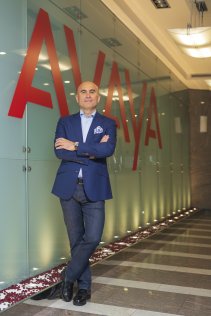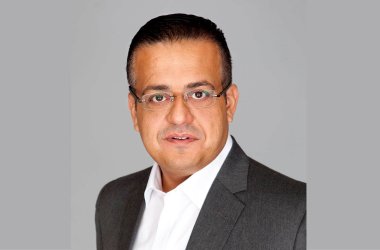CNME Editor Mark Forker spoke to Nidal Abou-Ltaif, President, Avaya International, to find out how the global unified communications leader is shaping what’s next for the future of work, how its solutions are enabling enterprises to create enhanced experiences for their workforce – and why the Middle East has been able to adapt so effectively to a ‘Work-from-Anywhere’ model.

The COVID-19 pandemic has fundamentally impacted many facets of our everyday life, but one of the most tangible examples of its effect has been the transformation of the workplace. On a global scale, companies have embraced the ‘Work-from-Anywhere’ model. Can you tell us how Avaya has adapted to the changing dynamics of the workforce, and how its solutions have empowered employees working remotely?
When the pandemic started, there was a huge rush to get people working from home. And I think a lot of organisations found they weren’t prepared from a technology point of view. First, the priority was to simply provide access to company resources and enable basic video conferencing so that employees could still interact. Then came the real work – addressing challenges around security, privacy, ease-of-use and adapting between systems.
At Avaya, I think it’s fair to say that we sprang into action to try to make it easier for our customers to move to a work-from-anywhere mindset and communicate easily. Within a month, we’d empowered 2 million remote workers across 11,000 companies around the world. We provided complementary 90-day remote worker licenses, and our teams worked around the clock to get our customers set up and working safely. I was immensely proud of my teams for the incredible dedication they showed.
In the year since, the intensity of our work hasn’t stopped, and we’ve been dedicated to helping our customers truly transition to a work-from-anywhere world. For sure, there’s a hybrid mindset emerging, and that’s borne out in the research we just completed. As it becomes safer to return to the office, we’ll see people want to move seamlessly between the office and home – choosing the best environment based on the tasks they need to complete.
With that direction in mind, we’re helping customers manage, for example, app overload – the fatigue of constantly switching between video conferencing, messaging, email, task management, whatever – with our workstream collaboration solution, Avaya Spaces. We’re helping organisations create Total Experience strategies to reimagine customer and employee journeys to the point that any experience across any touchpoint is effortless. And we’re doing that through composable solutions which address specific use cases and experiences.
It’s a very exciting time in that we’re genuinely driving new conversations around remote employee and customer engagement.
Avaya has commissioned Davies Hickman Partners to conduct research entitled ‘The Life and Work Beyond Study 2020’ – and some very interesting statistics were unearthed. In the UAE, 51% of respondents surveyed said they much felt much happier since beginning to work from home. As a global leader in unified communications that are designed to enhance workplace collaboration, why has the approach to remote working been such a success here in Middle East – and why do you think they are more satisfied than their counterparts in the UK and US?
Honestly, we aren’t surprised to see that Middle Eastern countries have managed the move to a work-from-anywhere world well. The region’s workforce is technologically literate, and there’s a high penetration of digital services with advanced infrastructure.
Certainly, one of the reasons why Middle Eastern workers have adapted to the change so well is that they’re among the best-equipped in the world for remote working. This is reflective of what we’ve seen in the field when enabling our customers to transition to a work-from-anywhere world – management moved quickly and decisively to empower their employees, and have since committed to a hybrid world of work.
All of that said, the rest of the world isn’t far behind – work-from-anywhere was already prevalent in a number of markets, and what we’ve seen is an acceleration of that trend.
Interestingly, 44% surveyed expressed a real fear that the rise of AI and automation will lead to them losing their jobs? Is this concern justified, or do you think that even if their jobs are replaced by AI, new jobs will be created for them as a result of these technological advancements? What is Avaya’s position on AI and automation in the workplace?
We specialise in infusing AI into customer and employee journeys. In that sense, the AI is there to make employees’ lives easier, not to replace their jobs.
As an example, in the contact centre, we’re using AI to better connect and orchestrate customer touchpoints across the customer journey, pulling insights, knowledge and resources from across the organisation. This helps users to deliver not only the right customer experience but also the right employee experience for those supporting the customer journey.
So, we’re helping organisations deploy machine-learning algorithms to determine the next best action by the agent, delivering the right information, step-by-step guidance, and knowledge articles to enhance the customer experience. Instead of replacing the agent, this actually increases both agent satisfaction and contact centre efficiency, because we’re providing additional empowerment to delight customers.
The survey also established that the UAE was the best equipped nation to foster an environment that allows hybrid and remote working to flourish. Why is the UAE in a better position that global superpowers such as the UK and US, and what advantages in terms of technology do they have over the other countries that were part of the research?
As we mentioned earlier, the Middle East has a very advanced infrastructure capable of delivering these sorts of services at scale. Other geographies have their strengths, too, of course. What’s impressive about the UAE, in particular, is the drive from the leadership to foster innovation and embrace the technological trends of the day. From the UAE Innovation Week that was launched in 2015, to the Emirates Mars Mission, technology is high on the agenda for sure. And recent moves such as the multiple-entry remote work visa show that the country is committing to the new world of work with just as much enthusiasm.
The work-from-anywhere model is here to stay, but what role will Avaya play on a global scale in terms of providing solutions that will keep the remote workforce connected at-all-times? What are your plans for the next 12 months?
Put simply, we’re shaping what’s next for the future of work. We deliver an incredibly differentiated set of capabilities to the world’s largest companies and governments. And the complexity and scale that we can handle, coupled with the experience, innovation, and breadth we offer our customers and partners, is unparalleled.
So, we will continue guiding our customers and partners as they make that transition to the new world of work. All while executing on our own transformation strategy that sees us continue our move to a cloud and SaaS business model. We’ve made great progress, and we can’t wait to see where the coming years take us.





